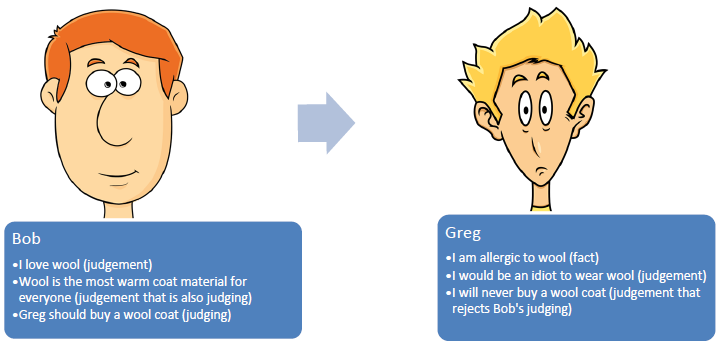When you exercise judgment, you are appraising to find the best answers for yourself. These answers may be in the form of decisions or opinions that may lead to actions or perhaps to entire ways of existence, all for oneself. Judgment, by virtue of being a noun, is a thing. A thing is something one has or does not have. It isn’t something that is correct or that can be proven to be incorrect. It is.
Judgment, therefore, is for self. Judgment is a good thing – one must have and use it to make decisions, progressions, regressions even, and to move along (even if not always forward) in life. Well used judgment exercises objective thinking, authoritative reasoning and good sense. Yet, it doesn’t always work out for the best. If it did, then the words “I” “am” and “sorry” would have never found their ways into a sentence together. Yet, even that apology is itself, a judgement. The scenario and options and information have been weighed and the judgment to apologize has been made. It’s, again, not right or wrong. It is the decision, the judgement, the owned noun, of the bearer. It is what it is.
Judgment, however, is often confused with “passing judgement” – which has now become the action verb: judging. Even in court trial language, the decision of the jury and judge is called a judgement. Alas, what is actually happening is that a judgement is being passed; the action moves from one person to another. Whereas judgement is for oneself – judging is of others.
Moving ones judgment from self to another doesn’t in itself make the act of judging bad or wrong. Judging can be incredibly helpful. There is a practice in the yoga teacher community of giving feedback after a class. If one teacher has taken another teachers class, after class, the teacher-student tells the teacher-teacher things that they think they must keep/stop/start doing. It isn’t uncommon for there to be more than one teacher-student taking a class – and in such situations, often the keeps from one teacher-student are the stops from another teacher-student. “I loved the music you played – keep making great playlists!” “I think that playing music takes away from your students ability to hear and synch their movements with their breath – stop playing music.” In both situations the teacher-student is judging the teacher-teacher. In neither situation is anyone right.
When we are judging – we are moving our judgment – creating a verb from a noun – and passing it to others. This is a perfectly acceptable thing to do – so long as we are aware that we are no longer right. The judgment for ourselves was right for us – regardless of what the actions of it turned out to be; it was ours, we own it. When moved to another person, our judging may or may not be right for that person. Metaphorically consider the movement of a judgement from one person to another as if it were a winter coat.
 In the yoga teacher example, the teacher-teacher is presented with two different judgments – both of which belong to the originator of the judgement – neither of which is necessarily correct for the teacher-teacher. She may choose to “try on” the coats of the judgements just passed to her and find that not playing music is like wearing a wool coat that she is allergic to. It’s a terrible judgment for her and she will take the other person’s judgment coat off and move on with her life.
In the yoga teacher example, the teacher-teacher is presented with two different judgments – both of which belong to the originator of the judgement – neither of which is necessarily correct for the teacher-teacher. She may choose to “try on” the coats of the judgements just passed to her and find that not playing music is like wearing a wool coat that she is allergic to. It’s a terrible judgment for her and she will take the other person’s judgment coat off and move on with her life.